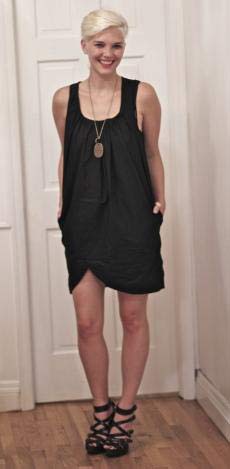|
 Six Items or Less, a self-imposed exercise in frugality, encourages people to wear the same six items of clothing for an entire month. |
That daily question often consumes time and causes stress. Some people might even stand before a stuffed closet and still think, 'There's nothing to wear.'
But, what if they had only six items of clothing to choose from and wear for an entire month? That's the idea behind Six Items or Less, a self-imposed exercise in frugality.
Practicing frugality
Six Items or Less is a social experiment, a gentle protest against fashion consumerism and the high cost of apparel. New York City advertising executive Heidi Hackemer came up with the idea.
"I know a really good friend in London. She and I were talking one day over Facebook messaging about clothing and how much time and energy we spend on clothes and how it seems to be a bit ridiculous," she says. "So she and I wanted to see if we can get our wardrobe down to a uniform and see what that type of effect that would have on the rest of our lives. Would we be stressed out by not having choices of clothing? Would we be more creative? Would our mind be freed up to do different things?"
|
 Heidi Hackerman modeling one of the six pieces of clothing she wore for a month. |
"When we went to work the next Monday, we spoke to a few people about it. We sent out a few tweets on Twitter," says Hackemer. "And all of a sudden, within five days, we had almost 100 people from around the world saying that they too wanted to take part in this experiment with us. So we started in June 21 and we ran the experiment through July 21."
Fewer choices, less stress?
And Hackemer says it was a very interesting month for a wide variety of people.
"We had an 11-year-old girl and we had a woman that was in her 60s. We had people from all walks of life," says Hackemer. "We had people from anywhere from Singapore to Dubai to London to Amsterdam, Brazil, all across the US. It just seems that a lot of people are struggling with their relationship with clothes and the way they consume them. That's why I think we had such a wide range of people participate."
Hackemer says she was surprised at how few people seemed to notice that she was wearing the same six items the whole month.
"I had a pair of cutoff shorts that I would wear on the weekend. And I had another item, a black blazer, that was very much about dressing up. I then mixed in other things like a black pair of pants and a black top and a skirt and a black dress."
She noticed having fewer choices reduced stress in her life.
"I learned what's really important and what's really worth stressing over. I also found that this simplicity echoed into other parts of my life, you know just walking more or cooking more food. I realized that - you know what? This stuff we let come into our world, physical stuff that we allow into our world, really jams up our mind. And actually our mind can be quite a powerful and positive thing if we cleared up a little bit."
Becoming a 'sixer'
Twenty-two year old Kristy Hogue, who lives in Seattle, Washington, learned about Hackemer's experiment through a magazine article. She says the idea appealed to her, so she decided to become a sixer.
"I felt I had too much of everything including clothing and a lot of it I didn't wear," she says. "So I thought it would be a great experiment to see if I could wear six items or less."
The experiment inspired Hogue to reexamine her wardrobe and get rid of the clothes she didn't wear. However, she admits, going for 31 days with only six outfits to choose from was quite a challenge.
"At the very beginning, my items were really easy to pick. They were items that I liked, that I wore a lot anyway. For the first week or so I was really excited and everything was working out perfectly and I never got bored. Then I started to feel a little bit constrained. I didn't have the freedom to look how I wanted to look all the time. So that was really frustrating. Then I eventually accepted it and started to be more relaxed, not caring as much about how I looked."
Most people who participated in the experiment were women. Thirty-five-year-old New Yorker Alexander Smith was one of 40 or so male 'sixers'. He picked six items from his wardrobe, but ended up wearing only five of them.
Getting more out of less
"The most difficult part for me was having to do hand wash laundry pretty much every day in order to have clothes for the next day." says Smith.
The experiment changed his perspective on what makes people happy.
"We're exposed to choices for everything. There are hundreds of consumer opportunities. But all that choice doesn't necessarily lead up to any kind of fulfillment. We're obsessed with novelty. We go after that when, in fact, slowing down a little bit and considering your choices a little more tightly, maybe constraining yourself in some ways, actually leads to more time, more happiness and more fulfillment."
The Six Items or Less website includes a forum for participants and observers to exchange ideas and express themselves. Heidi Hackemer says it received a lot of traffic during the month-long experiment.
And, she adds, more than 1,000 people from all over the world expressed interest in taking part in the next cycle that starts in October.
blazer: a jacket, not worn with matching trousers/pants, often showing the colours or badge of a club, school, team, etc. (常帶有俱樂部、學(xué)校、運動隊等的顏色或徽章的)夾克
To break fashion rules 打破時尚規(guī)則
(來源:VOA 編輯:陳丹妮)
